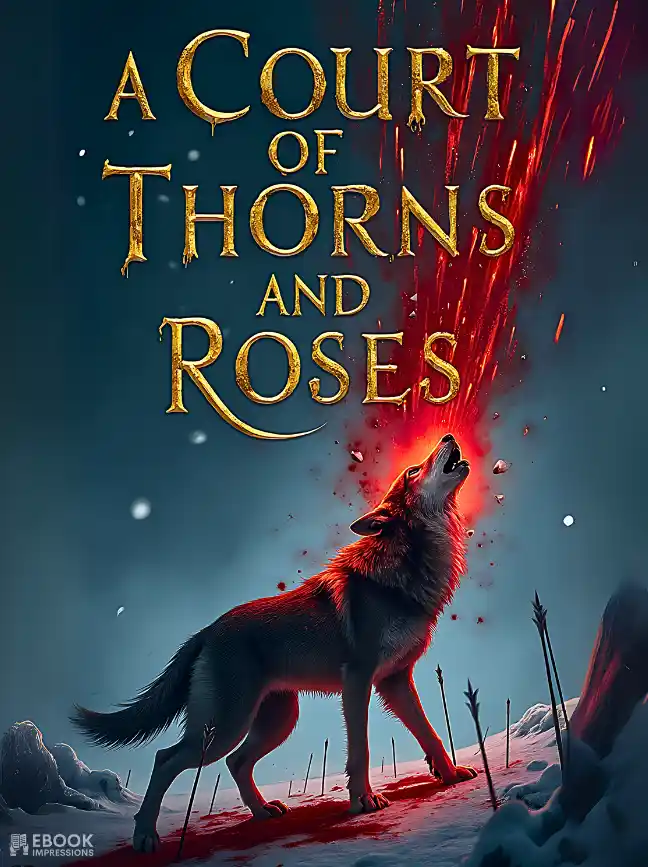Chapter no 39
From that moment onward, each day followed a dark, torturous rhythm, etched into my mind as if it were as permanent as the ink on my arm. Morning after morning, I woke in the same gossamer scraps of clothing, the paint clinging to my skin, and the memory of humiliation fresh in my veins. My meals came hot, courtesy of Rhysand’s command, but I cursed him nonetheless with every bite I swallowed. I spent my days in the stillness of my cell, numbly reciting Amarantha’s riddle, each word a haunting echo. No answer came to me—only a pounding headache and the gnawing sense of failure.
Rhysand didn’t visit, nor did Lucien or Tamlin. Silence wrapped around me like a noose, broken only by the screams echoing from the depths of the dungeons. When the sounds became unbearable, I’d stare at the tattooed eye on my palm, feeling its unblinking weight. Was it watching me? Or mocking me? Some nights, when exhaustion dragged me close to madness, I could have sworn it blinked.
On the fourth day, if my count was right, two High Fae females appeared in my cell. Shadows cloaked their forms, their faces indistinct, and they didn’t utter a word. Cool, shadowy hands gripped my arms, and they led me out of the cell—through the very walls themselves, as though I’d become nothing more than a shadow. The sensation sent shivers crawling down my spine, and I barely kept from stumbling as we passed the dungeons and their haunting screams.
They took me to a forgotten room, where they bathed me roughly and painted intricate designs across my body. The brushes were icy, and their movements left no part of me untouched. I struggled at first, demanding answers they wouldn’t give, until my will crumbled under the futility of it. When they were finished, I looked at myself in the mirror they presented. From the neck up, I was a vision of elegance—golden dust on my eyelids, kohl lining my eyes, and a diadem in my hair. But from the neck down, I was an object, a painted thing clad in a whisper of fabric that left me more exposed than clothed.
I barely had time to process my fury before the door opened, and Rhysand entered, leaning against the frame with his usual arrogance. “Our bargain hasn’t started yet,” I snapped. But he only smiled, a predator’s smile.
“I needed an escort for the party,” he said simply. His violet eyes gleamed with amusement as he looked me over, taking in the paint and the flimsy gown. “You look just as I hoped you would.”
When I demanded to know if the outfit and paint were necessary, he stepped closer, his hand brushing my shoulder, smearing the paint. It re-formed instantly, and his voice dropped to a murmur, “How else would I know if anyone touches you?” He didn’t hide the possessiveness in his tone or the way he called me his “belonging.” Ice pooled in my gut at the word, and the weight of his bargain pressed harder on my chest.
The throne room was a nightmare I thought I couldn’t face again, but Rhysand gave me no choice. The faeries and High Fae gawked as we entered, whispers snaking through the crowd. Rhysand didn’t touch me, but his presence beside me was enough to make it clear who I belonged to. My chin lifted higher, defiance burning in my veins despite the humiliation.
Amarantha greeted us with thinly veiled disdain, though her attention lingered on me longer than I liked. Rhysand, ever the manipulator, revealed our bargain with a flourish, displaying the tattoo on my arm for all to see. “One week with me at the Night Court every month,” he announced, his tone as casual as if discussing the weather. “For the rest of her life.”
Tamlin’s face was stone—his silence a mask I couldn’t decipher. I wanted to scream at him, to demand he look at me, but Rhysand steered me away before I could. The rest of the night passed in a blur of whispers, stares, and music that felt like knives in my ears. Rhysand kept me close, his hand occasionally brushing my back as if to remind everyone, including me, who held the reins.
That night, like every night, I drank the wine Rhysand handed me. And like every night, it swept me into oblivion, sparing me the memory of what followed.
The days passed in a cycle of degradation and survival. Each evening, I was dressed, painted, and paraded into the throne room, where Rhysand commanded me to dance or sit in his lap. The paint on my body told the story of every touch, and while his hands never roamed beyond my waist and arms, the humiliation was absolute. I woke each morning sick and exhausted, the memories of the night before blurred but never forgotten.
Lucien visited once, his presence a rare balm to my fraying nerves. He draped a stolen cloak over my shoulders and muttered curses about Rhysand under his breath. When I asked if Tamlin had seen me, his confirmation cut deeper than any blade. “Rhysand did it to provoke him,” Lucien said grimly. “But Tamlin didn’t react.” The words hung heavy between us, a reminder of the game we were all trapped in.
The second trial loomed on the horizon, and Rhysand delivered the news with his usual infuriating calm. “It could be your last,” he said, watching me closely. But when I asked why he’d saved me—why he cared—his only reply was a cryptic smile and a question of his own: “Why does any male need a reason to enjoy the presence of a female?”
Each step I took in that throne room, each glance I stole at Tamlin’s stony face, each cruel laugh that echoed around me—it all added to the weight of my bargain. Rhysand’s games were endless, his motives unreadable. And yet, as much as I despised him, I couldn’t deny the flicker of something else in his actions—a glimmer of strategy, of purpose, that I couldn’t yet grasp.
I hated him for what he was. But more than that, I hated the hold he had over me, the way he played my life like a pawn in his grand, unknown game. And I hated that, despite it all, I wasn’t entirely sure I wanted him to lose.
Chapter no 40
Feyre is summoned before Amarantha for her second trial, a test filled with sinister intent. Amarantha’s smug demeanor and the lurking Attor’s unsettling grin set the tone for an intense ordeal. Feyre finds herself lowered into a pit divided by a metal grate, where Lucien is chained on the other side. Above her, spiked chandeliers descend, threatening to crush both of them. Amarantha’s sadistic challenge requires Feyre to solve a riddle and pull the correct lever to stop the spikes. Feyre’s inability to read the inscription sends her into a state of panic as the spikes inch closer.
Feyre desperately tries to decipher the riddle but is unable to make sense of the words. The spiked grates descend rapidly, and the overwhelming heat and pressure threaten to crush her spirit. In the chaos, she notices the slitted eye tattooed on her hand reacting with pain when she reaches for certain levers. This mysterious connection guides her to pull the correct lever at the last moment, halting the spikes and saving both herself and Lucien. The crowd, including Amarantha and Tamlin, watches in stunned silence as Feyre emerges alive, though shaken and filled with self-doubt.
Back in her cell, Feyre collapses into a torrent of tears, consumed by her inability to read and the overwhelming realization that her survival was based on chance and external intervention. Her despair deepens as she reflects on her perceived shortcomings and the hopelessness of her situation. She feels trapped, broken, and certain that she will fail the final task, leaving Tamlin and his people forever bound to Amarantha’s cruelty. The walls of her cell seem to close in on her, amplifying her mental anguish.
Rhysand appears unexpectedly, interrupting her breakdown with his characteristic arrogance. He forces her to stop crying in his own unsettling way, licking away her tears and taunting her about her illiteracy. Despite her anger and humiliation, Rhysand’s presence distracts her from completely unraveling. His parting remark about teaching her to read hints at a potential shift in their dynamic, as he unexpectedly provides her with a semblance of stability and prevents her from succumbing to despair.
As Feyre is left alone once more, she realizes that Rhysand’s intervention, though intrusive and unwelcome, kept her from breaking completely. The tattooed eye on her hand serves as a reminder of her bond with him, one that she resents but cannot deny. She paces her cell, torn between anger and a faint glimmer of determination, acknowledging that she survived the trial despite the odds. Rhysand’s cryptic actions leave her questioning his motives, but they also plant a seed of resilience that may help her face the challenges ahead.



